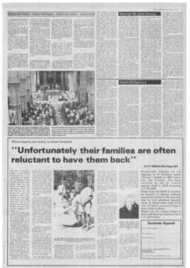Page 6, 17th June 1977
Page 6

Report an error
Noticed an error on this page?If you've noticed an error in this article please click here to report it.
Tags
Share
Related articles
"the War Is Over, But There Is No Peace"
The Peace And Russia
Our Mori Indignation
Prof. Laski Talks Too Much
Churchill, Stalin And Dumbarton Oaks
Suffering of the Jews in Russia
PEACE, freedom and justice — three ideals which command the respect, in theory if not in practice, of every nation on earth. So the eyes of the world were on the conference between the Western powers and the Communist bloc, which opened in Belgrade on June 15. The conference was reviewing the He4sinki Declaration of 1975, and one group certain to watch the progress with concern are the Jews in Russia,
They exemplify in a dramatic way what many in the West regard as the dismal failure of the Soviet regime to implement assurance on human rights that were given at Helsinki. Indeed, there is abundant and increasing evidence that the harassment of Jews, far from being eased, has in fact been intensified over the last few months.
The latest stage in the campaign can be traced back to January when an unambiguously anti-semitic programme was shown at peak viewing time on nationwide television. Then, in . March, a prominent article in the government newspaper Iszvestia accused several leading Jews of aiding the CIA to obtain intelligence information on "scientific-technical and military subject matter and on political questions".
On the same day that the article appeared, the KGB raided the accused men's flats, ripping open pillows and tearing the backs off photographs.
One of the accused, Anatoly Shcharansky, has since been reported as having been charged with an offence which can carry the death penalty. Three of the Jews involved are socalled refuseniks' — people who have applied for visas to leave and who have been refused. Refuseniks are the targets of repeated intimidation, and provide exa m pl es of the Russian government's cynical manipulation of Soviet law.
Requests for permission to emigrate frequently result in a prompt call-up to the Army. To comply means an obligatory two and a half years service, after which they are told that they cannot be allowed to leave because they now possess "secret information", Jews of course are not alone in facing persecution of this sort. But it is undeniable that as a group they suffer from dis
crimination that other "dissidents", including other religious minorities, escape.
Historically, the close reltitionship between religion and nationality has been a source of great strength to Jewry. But in Russia it has become instead a source of considerable weakness. In Soviet eyes, a worshipping Jew is almost by definition a committed Zionist. On the face of it, Jews have little to hope for from the talks in Belgrade. The monolithic structure of Soviet power seems unlikely to bend to any significant extent.
But the impression may well be over-pessimistic. The situation is not hopeless, nor is the Soviet system incapable of change.
Many experts — and among them the Rev Paul Oestreicher, the chairman of the British Council of Churches Cornmittee on East-West relations — believe that the potential for change in Russia, is considerable. They argue that it is a country shot through with a total lack of idealism, and that paradoxically perhaps, precisely because of that, it is open to almost any change that appears pragmatic: change for example that might further detente.
This means that the Western counties must attempt to maintain a tricky diplomatic balancing act in Belgrade. They must avoid a quarrelsome slanging match, which would achieve nothing, while maintaining their firm position on human rights. To do this with success they must be able to state categorically — and to give evidence to back their assertions — that they are under pressure in their own countries from their own citizens.
In other words, the public must make their views known to the government and say clearly "We demand that you stand up for the fundamental rights of ordinary people, wherever they are".
The churches have the ability both morally and organisationally to see that this is done. If they were to do so, it would advance the dialogue between Christians and Jews more than any number of theological symposia. More importantly, it would give a clear demonstration that to represent Christ in the world means to stand against oppression and discrimination wherever they occur.
John Carey
blog comments powered by Disqus











